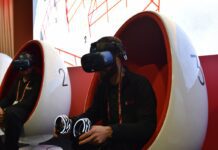
A new study has discovered the potential use of artificial intelligence in combating nausea, headaches, and dizziness experienced by virtual reality (VR) users.
The study, titled “Identifying presence of cybersickness symptoms using AI-based predictive learning algorithms,” was conducted by researchers from Charles Darwin University and Torrens University to explore the use of AI and machine learning algorithms in predicting cybersickness for potential users of VR technology with headsets.
CDU Associate Professor Niusha Shafiabadym, a co-author in the study, said having the ability to predict the occurrence of cybersickness for an individual was crucial and would help VR developers and manufacturers to develop solutions aimed at creating a better experience for users.
“In the era of technology and especially after the Covid-19 pandemic, the need for remote access and virtual education has grown significantly. Cybersickness is one of the factors that hinders the users from using VR devices because of the great discomfort due to the VR experience,” Shafiabady said.
The study leveraged questionnaire data, which was split into two groups: people who experience cybersickness symptoms within minutes of using VR devices, and people who would not have issues with using VR devices.
The data was processed through Ai-Labs, created by Associate Professor Shafiabady, which revealed that AI could predict discomfort among VR users with 93 per cent accuracy.
Shafiabady said the research team looks to using explainable AI algorithms to explore why the AI algorithms made the predictions to inform VR developers and manufacturers why users will have discomfort.
“We are moving towards the times where we use VR devices for essential activities such as servicing manufacturers remotely and teaching, to less essential but more fun activities like looking into the outer space through VR lens,” Shafiabady said.
The study, published in the journal Virtual Reality, was conducted by Fawad Zaidi, Associate Professor Shafiabady and Emeritus Professor Justin Beilby.



















